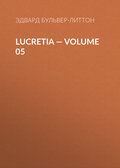
Эдвард Бульвер-Литтон
Godolphin, Volume 2
CHAPTER XXI
AN EVENT OF GREAT IMPORTANCE TO THE PRINCIPAL ACTORS IN THIS HISTORY.—GODOLPHIN A SECOND TIME LEAVES ENGLAND
Goldolphin was welcomed with enthusiasm by the London world. His graces, his manners, his genius, his bon ton, and his bonnes fortunes, were the theme of every society. Verses imputed to him,—some erroneously, some truly,—were mysteriously circulated from hand to hand; and every one envied the fair inspirers to whom they were supposed to be addressed.
It is not my intention to reiterate the wearisome echo of novelists, who descant on fashion and term it life. No description of rose-coloured curtains and buhl cabinets—no miniature paintings of boudoirs and salons—no recital of conventional insipidities, interlarded with affected criticisms, and honoured by the name of dramatic dialogue, shall lend their fascination to these pages. Far other and far deeper aims are mine in stooping to delineate the customs and springs of polite life. The reader must give himself wholly up to me; he must prepare to go with me through the grave as through the gay, and unresistingly to thread the dark and subtle interest which alone I can impart to these memoirs, or—let him close the book at once. I promise him novelty; but it is not, when duly scanned, a novelty of a light and frivolous cast.
But throughout that routine of dissipation in which he chased the phantom Forgetfulness, Godolphin sighed for the time he had fixed on for leaving the scenes in which it was pursued. Of Constance's present existence he heard nothing; of her former triumphs and conquests he heard everywhere. And when did he ever meet one face, however fair, which could awaken a single thought of admiration? while hers was yet all faithfully glassed in his remembrance. I know nothing that so utterly converts society into "the gallery of pictures," as the recollection of one loved and lost. That recollection has but two cures—Time and the hermitage. Foreigners impute to us the turn for sentiment; alas! there are no people who have it less. We seek for ever after amusement; and there is not one popular prose-book in our language in which the more tender and yearning secrets of the heart form the subject-matter. The Corinne and the Julie weary us, or we turn them into sorry jests!
One evening, a little before his departure from England—that a lingering and vague hope, of which Constance was the object, had considerably protracted beyond the allotted time—Godolphin was at a house in which the hostess was a relation to Lord Erpingham.
"Have you heard," asked Lady G–, "that my cousin Erpingham is to be married?"
"No, indeed; to whom?" said Godolphin, eagerly. "To Miss Vernon."
Sudden as was the shock, Godolphin heard, and changed neither hue nor muscle.
"Are you certain of this?" asked a lady present.
"Quite: Lady Erpingham is my authority; I received the news from herself this very day."
"And does she seem pleased with the match?"
"Why, I can scarcely say, for the letter contradicts itself in every passage. Now, she congratulates herself on having so charming a daughter-in-law; now, she suddenly stops short to observe what a pity it is that young men should be so precipitate! Now, she says what a great match it will be for her dear ward! and now, what a happy one it will be for Erpingham! In short, she does not know whether to be pleased or vexed; and that, pour dire vrai, is my case also."
"Why, indeed," observed the former speaker, "Miss Vernon has played her cards well. Lord Erpingham would have been a great match in himself, with his person and reputation. Ah! she was always an ambitious girl."
"And a proud one," said Lady G–. "Well, I suppose Erpingham House will be the rendezvous to all the blues, and wits, and savans. Miss Vernon is another Aspasia, I hear."
"I hate girls who are so designing," said the lady who spoke before, and had only one daughter, very ugly, who, at the age of thirty-five, was about to accept her first offer, and marry a younger son in the Guards. "I think she's rather vulgar; for my part, I doubt if—I shall patronise her."
"Well, what do you think of it, Mr. Godolphin?—you have seen Miss Vernon?"
Godolphin was gone.
It was about ten days after this conversation that Godolphin, waiting at a hotel in Dover the hour at which the packet set sail for Calais, took up the Morning Post; and the first passage that met his eye was the one which I transcribe:—
"Marriage in High Life.—On Thursday last, at Wendover Castle, the Earl of Erpingham, to Constance, only daughter of the celebrated Mr. Vernon. The bride was dressed, &c., –" And then followed the trite, yet pompous pageantry of words—the sounding nothings—with which ladies who become countesses are knelled into marriage.
"The dream is over!" said Godolphin mournfully, as the paper fell to the ground; and, burying his face within his hands, he remained motionless till they came to announce the moment of departure.
And thus Percy Godolphin left, for the second time, his native shores. When we return to him, what changes will the feelings now awakened within him, have worked in his character! The drops that trickle within the cavern harden, yet brighten into spars as they indurate. Nothing is more polished, nothing more cold, than that wisdom which is the work of former tears, of former passions, and is formed within a musing and solitary mind!







